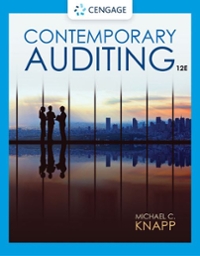Brian Fox quickly turned around Powder River. In 2006, the company reported a net income of $5.7
Question:
Brian Fox quickly "turned around" Powder River. In 2006, the company reported a net income of $5.7 million on revenues of $13.2 million. The company's balance sheet for that year reported nearly $25 million of assets, the bulk of which consisted of investments in oil and gas properties. Thanks to the company's profitable operations in 2006, Fox's compensation for the following year approached $1.5 million. Powder River's rapid turnaround was due to a new business strategy that Fox implemented for the company. In 2004, Fox began marketing minority "working interests"
in oil and gas properties owned by Powder River to foreign investors through a business associate that he had worked with in the past. Fox arranged for the company to purchase oil and gas properties in several southern states, including Louisiana, Oklahoma, and Texas, and then, with the help of his business associate, sold working interests in those properties to Asian investors, principally well-heeled citizens of Singapore. The company reported that it intended to use the proceeds from the sale of the working interests to develop its oil and gas properties and to purchase additional properties.
A key factor in the initial success of this strategy was the huge difference between the amounts paid for the oil and gas properties by Powder River and the prices at which the company sold working interests in those properties to the Asian investors. For example, Powder River's 2006 federal tax return reported $17.7 million of taxable revenue from the sale of working interests in oil and gas properties that it had purchased over the previous 12 months. The cost basis of those working interests for Powder River was less than $150,000.
During the time frame that the company was selling the working interests, Brian Fox repeatedly maintained that the company's "primary focus" was "oil and gas exploration and development," while its "secondary focus" was the marketing of minority working interests in those properties.2 In fact, the $13.2 million of revenue reported in the company's 2006 income statement consisted of $12.6 million of revenue from "Property and Working Interest Sales" and only $554,000 of revenue from "Oil and Gas Sales."3 Following is the description of Powder River's revenue recognition policy for the sales of working interests that was included in the company's 2006 financial statement footnotes.
As the Company finds and purchases new properties, it makes arrangements to sell partial working interests to various individuals referred to by [sic] the Singapore Group. The revenues are recorded as operating revenues, net of any commission or other costs associated with earning the revenues. The related percentage of capitalized cost of the property sold is also removed from the oil and gas property account and offset against the proceeds to calculate the net revenue recorded in the operating revenues.
Powder River's common stock traded over the counter on what was known at the time as the "Pink Sheets" network, a nationwide network of stockbrokers that shared bid and ask prices for small publicly owned companies. Because Powder River's securities were registered with the SEC, the company filed audited financial statements annually with that federal agency.
Questions
1. Identify the primary audit risk factors that were evident within Powder River’s operations. Briefly explain the significance of each.
2. How should Powder River have recorded the sales of the working interests and the guaranteed payments made to the purchasers of those working interests in its accounting records?
3. U.S. auditing standards identify the principal "management assertions" that underlie a set of financial statements. What management assertions were particularly relevant to (a) the "sales" of working interests and (b) the guaranteed payments made annually by Powder River to the purchasers of those working interests?
4. The SEC and PCAOB criticized CBN for failing to discover that Powder River did not own certain assets included in its reported oil and gas properties. How would you characterize that oversight? That is, did this oversight constitute negligence, recklessness, or fraud on the part of those auditors or none of these? Defend your answer.
5. Powder River relied on the expertise of petroleum engineers in arriving at the estimates of its proved reserves. What responsibility, if any, do auditors have to assess the qualifications of such experts used by clients?
6. The PCAOB criticized Todd Chisholm for failing to establish a proper "quality control" system for CBN. What are the primary issues that should be addressed by the quality control system of an audit firm that has public company clients? Provide examples of circumstances in which Chisholm and/or CBN violated the PCAOB's quality control standards for audit firms.
Step by Step Answer:






